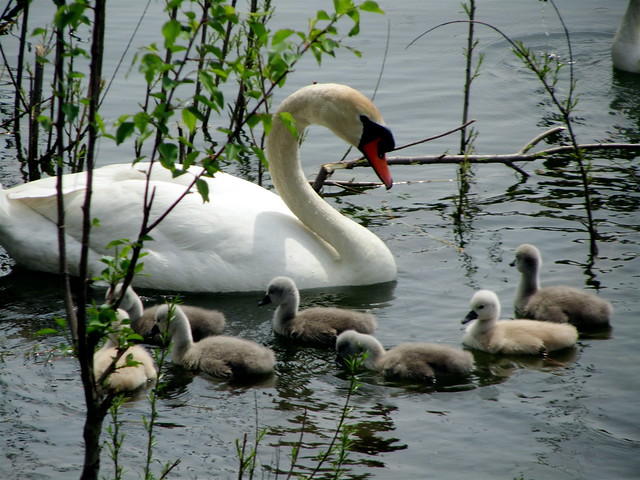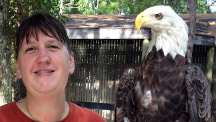The Cheboygan County Habitat for Humanity charity is going to recruit area locals to offer self-made birdhouses or bird feeders at their April 6 fundraiser. Read Erica Kolaski’s story Habitat fund-raiser is truly for the birds in the Cheboygan Tribune.
Study Of Mute Swans Explains Evolutionary Riddle
In an important new study forthcoming from The American Naturalist, biologists from the University of Oxford tracked a colony of Mute Swans for more than two decades to explore a longstanding evolutionary question: Does the number of eggs laid by a female bird – “clutch size” – change in accordance with natural selection?
read more | digg story

Another spring, another swan family by rkramer62, Creative Commons on Flickr
Indian Native Among Top-Seen Birds In Britain
The parakeet (psittacula krameri), native of India, is now the 20th-most-spotted bird in Britain. In some areas of London, the bird is in the top 10 most spotted. The current population of 13,000 birds is estimated to approach 50,000 by the year 2010. Read the story Indian Bird Among Top-Seen Birds In Britain at NewKerala.com, but bear in mind that the RSPB is the Royal Society for the Protection of Birds, not the Prevention of Birds as mentioned in the article!
Birds Leave Frigid Ukraine For Turkey
Severe cold weather in the south of the Ukraine has caused migratory birds to fly south to Turkey. This might lower the risk of bird flu in the Ukraine, but what does it mean for Turkey? Bird flu has been detected in 23 districts in the Ukraine so far. Four people have died of bird flu in Turkey this season.
Arkansas Ivory-Bill Vs. Army Corps Judge Recuses
The judge in the case of the environmentalists vs. the planned Grand Prairie Irrigation Project in Arkansas has recused himself, delaying the proceedings until 6 February. The judge had donated to the Audubon Society in the past and recused himself after learning they had filed a brief in the case. Read Rob Moritz’s story in the Arkansas News Bureau.
Toga’s Parents Expecting Again
The parents of the baby penguin stolen from a UK zoo last month have laid another egg and are expecting to have a baby penguin in early March. Read Kyala and Oscar’s story on CNN.
India Bird Sanctuary: Rickshaw Drivers Trained As Guides
Over 300 species of birds can be found in the Keoladeo Ghana National Park in Bharatpur, India. As no motorized transport is allowed in the park, tourists who don’t wish to walk or cycle themselves can opt for a cycle rickshaw.
The 122 cycle rickshaw drivers from the rural surroundings of Bharatpur received a three-month training on bird identification from the World Wildlife Fund, making them not only tranport providers but valuable guides. Read one rickshaw driver’s story in Ranjana Narayan’s article for New Kerala, A bird view of a Bharatpur cycle rickshaw driver.
Wisconsin Company Markets Wild Bird Health Food
Kaytee Products of Chilton Wisconsin is producing a wild bird feed with supplements such as ginger, garlic and echinacea, aimed at keeping the back yard visitors healthy. Read more in the Green Bay Press-Gazette story Chilton company boosts nutrients in wild bird food.
Environmentalists Sue To Save Ivory-Billed
The National Wildlife Federation and the Arkansas Wildlife Federation will present oral arguments in Little Rock federal court this week to try and prevent the Army Corps of Engineers work on the Grand Prairie Irrigation Project. The environmentalists believe the project threatens the Ivory-Billed Woodpecker, thought to be extinct since 1944 but spotted in Arkansas’ Cache River National Wildlife Refuge in 2004. The refuge is 20 miles from the current Irrigation Project construction site.
The groups want the project halted so that scientists can study the project’s environmental effects. Two previous lawsuits filed by the groups were defeated, but both of those suits were filed before the rediscovery of the Ivory-Billed.
The Grand Prairie Irrigation Project plans to draw 158 billion gallons of water each year from the White River – 1.5% of the river’s annual flow – and distribute it to approximately 1,000 area rice farmers. Project leaders say that failure to complete the project will cost farmers as much as $46 million per year. The project will take 13 years to complete at a cost of $319 million.
Supporters of the National Wildlife Federation’s attempt to stop the Irrigation Project from continuing can visit the NWF’s campaign website.
Sources:
Environmentalists say irrigation project would harm rare bird
Bird’s Advocates Challenge Corps
Woodpecker’s discovery brings call to stop irrigation project
Local Government Debates Over Gull Nuisance
The problem of aggressive, loud and annoying gulls has been on the political radar of Leiden, the Netherlands since 1988. That was when the fox population of the nearby sand dune area Meijendel was displaced. Because the gulls built their nests in the Meijendel sand, they were easy prey for the foxes. Since there are no foxes in the area anymore, the population of gulls in the dunes has increased so much that individuals must seek shelter elsewhere. So the gulls came to Leiden.
The gulls cause the most nuisance during their breeding season, when they make the most noise. They shriek the loudest at possible predators or behaviors they regard as potentially dangerous. The gulls can become aggressive if they feel threatened enough. The breeding season begins in mid-April.
In April 2005 the local government issued a statement with recommendations on how to reduce the nuisance caused by the gulls. The most significant recommendation was to reduce the amount of garbage on the city streets, which the gulls forage for food. “A clean city insures less annoyance.”
This year another proposal has been given. Leiden council member Sabine Verschoor from the political party D66 is promoting the shaking of gull eggs in order to limit the population and therefore the nuisance caused by the cacophonous birds. Thus far, shaking has been prohibited as the gull is a protected bird. Verschoor hopes that a pilot phase allowing shaking will bring clarity to the situation: “Now you cannot do anything, while half of Leiden suffers from the nuisance.”
D66 Leiden has proposed another solution for dispersing the annoying birds: placing wires on rooftops which will make them undesirable places for the birds to roost.
According to council candidate Aad van der Luit, a solution such as this will only work if entire streets will participate in the program. If the birds are able to find an alternative rooftop on which to land nearby, the wire program will fail.
Source: Raadslid wil proces over illegaal schudden meeuweneieren



